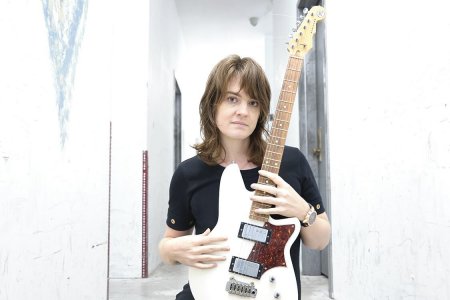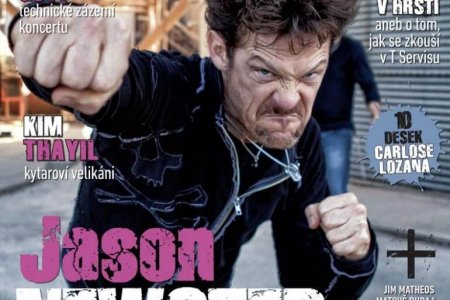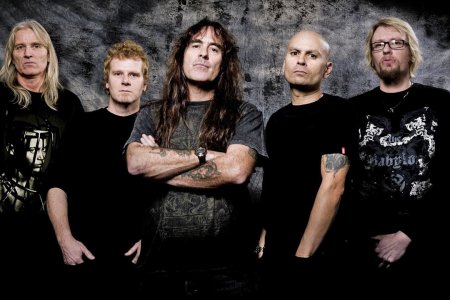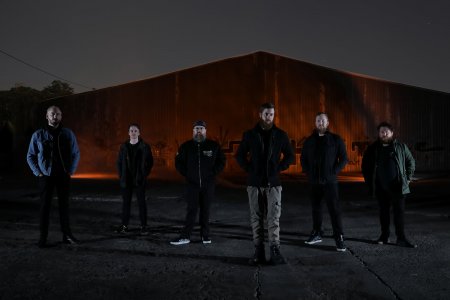Amos Williams from British band Tesseract belongs into most interesting bass players of progressive rock scene. The early days of Tesseract, which are considered main acts of modern progressive heavy scene, were metal, but over a decade they went through inspirational development. Their third album Polaris and a contract with Kscope, where they are accompanied by acts as Anathema, Katatonia or Steven Wilson, predicts their direction for upcoming years. Term “progressive” can be also used to describe a life of a producer and a fan of top quality bass gear Amos Williams, who was currently in China, in the time of our interview. We started with some gear questions.
Credit for profile pictures of Amos: sweeneysphotography.com
First of all, please describe us your cooperation with Warwick. FNA Jazzman plays a crucial role in your bass collection, however it is not produced anymore. We could also see few more other models on you.
For many years I’ve used Warwick basses, and in many respects, I feel it would be fair to say that because of the process that Acle follows whilst mixing, and certainly because of the environment of a concert, TesseracT may have built its ‘sound’ around the Warwick tone; or at the very least, the shaping we apply to the Warwick tone. However, on a recent visit to San Diego in California, I decided to visit the factory run and owned by Jeff Kiesel. I found the instruments on show there to have a far closer tone profile to the TesseracT sound initially than the Warwick profile. I also found them to be fun to play. When you’re performing for 6 weeks on the road, you need an instrument that is not only reliable and solid, but also an instrument that has little impact upon you physically.
What’s the progress with your signature model then?
I’ve only ever worked on custom models through the custom shop with Warwick. However, over the last year, I have been working with Jeff Kiesel on a prototype signature version of Kiesel’s much celebrated Vader series. I have chosen Ash as a body wood; a Musicman style pickup in a position that is slightly altered to normal position; and a neck wood that has sustain and rigidity. It has been a wonderful process to tweak each element, and to road test each prototype over the past year.
How did D’Addario’s XL strings deserve your stable interest? I must say that on your latest record, I can gladly hear the finger movement on the strings more clearly than ever…
TesseracT started touring a lot in about 2010. I found I needed a string set that sounded the way I needed it to immediately, without a breaking in period; and kept that tone and feel for three or four shows. After trying a few different manufacturers, I settled on D’Addario. And was fortunate enough to meet their artist rep in NYC on one of our early tours. We also use Planet Waves cables, as believe it or not, it makes a difference to the tone of the instrument as much as the strings, pedals, and bass choices.
However, D’Addario strings were not so user friendly at Jägermeister Ice Cold Gig. How did you handle ice cold strings?
Ha, that was fun. And well, they held their tuning well, which was the important point at that gig. At the time, I was more concerned with how cold it was, but when mixing the show later, I was very happy that they did what they were supposed to do. Namely, holding tune (even in such extreme arctic conditions), and sound full and detailed, too.
The clear sound and not hiding behind the gear is a great philosophy of yours and the whole band. Could you describe to the readers the other crucial parts of your gear?
TU-2 Tuner:
A performance, at our level is often a case of working with a compromise, and damage limitation. Image the chaotic, and frenetic nature of a show, with varying light levels and positions. The TU-2, and now the TU-3 tuners by BOSS, are very easy to use, clear to view in compromised situations, rugged and reliable.
Black Finger:
I haven’t used an amplifier, or a cabinet on stage for a good few years now. I find that Electro Harmonix’s Black Finger compressor, helps to add a little bit of grit, and saturation to my tone. So, I don’t really use it as a compressor as such, but more of a colouration device. In fact, I run a compressor prior to this, the Darkglass Super Symmetry Compressor. Even this though, I only use to tame the extreme peaks of my slapping parts.
Avalon U5 DI:
If I were to choose one piece of equipment, it would have to be the studio stalwart, Avalon’s U5 DI box. Built like a tank, with a universal power transformer, and the most honest signal path I have ever experienced. It is like removing a cloth from your sound as the old adage states. It forces you as a player to truly hear what you are playing, all the details that may get hidden are revealed. This gives a player, certainly me anyway, confidence. It also forces me to be hyper aware of the nuances of a performance. In fact in some sections I really do just find myself lost in the quantum level like minutia of a part; the clicking of the strings as I slide up the thread of the string along the fretboard. Or the difference in envelope shape of the note between plucking and thumping/tapping with my right hand. It’s a glorious and terrifying piece of equipment.

If I were to choose one piece of equipment, it would have to be the studio stalwart, Avalon’s U5 DI
Any other item on your radar, to be soon included to your gear?
I’ve recently been using MXR gear for power isolation and distribution, as well as their awesome 10 band EQ pedal, which I use to tame a little extreme lows, and highs, as well as my most hated frequencies, namely 500 Hz, and 4 kHz. By dipping those out it allows the important parts on the signal to dominate my tone.
Could you also describe us your approach to get a clear sound, finding a right balance between top & bottom end?
For me, my tone is all about how you shape the mid-range. Conversely, bass isn’t just about the low end. Yes, the fundamental of the note is low, but the human ear is focused upon high mids. So the quality of my tone, is all about tuning the mids, and getting the balance between high mids, and low mids, and cutting the mud within this range, which I find to be around 500 Hz. Although the sub within the signal helps with power, I find it takes up a lot of the signal space, and really it feels like a lot of noise down there. I’m all about trying to find maximum volume with minimum voltage, and to hear rather than just feel the sub, you need a lot of voltage. So, I try to find the alternatives from the mid-range.
Next to playing, you are also active as a sound engineer. Is your priority here as well to find a proper balance for a “client”?
If you mean do I approach my role within TesseracT as if I were a producer and engineer, and not just as a bass player in the band, then yes. Most certainly. I am always trying to take a position of perspective. Indeed it is fairly difficult to set aside my desires as a bass player, as they sometimes conflict with my vision of the group as a whole.
I am always trying to take a position of perspective
We could also hear you once in a while taking a role of a support growl. Did you take purely solo approach within this field or consult it with some other singers, which use it daily?
I’m not particularly confident in my voice. As such, I’m not very fond of singing, let alone ‘growling’. In fact, it’s not a sound I enjoy in general, nor something I think the band ever wants to focus upon heavily. I guess that is why there has been an apparent transition away from ‘metal’ for TesseracT. I have only ever spoken to one vocalist other than Dan about growling. That was Eric Kalsbeek, who used to sing for Textures. He has such an incredible voice, and a very good technique to my mind. So, I like him, follow the resonant technique, where I find the natural tone of my growl, and use just that, so there is little strain, or stress on my vocal chords. And as I have a very husky, and low speaking voice, my growls are deep, and somewhat muddy, too. Much to my live engineer’s dismay.
Bass playing
I find your bass playing approach very personal and confident. Please try to explain to the readers your approach – “perform music through bass”.
I have quite a diverse musical education, in my opinion. It is mainly percussive in nature, but it draws from all over the world. So really, anything goes as far as I’m concerned. I find, I assume like many musicians, whilst listening to a song, or whilst playing along to a song, I hear parts that are not there, and I have to chase the creation of these illusionary bass lines. So, often I find the song is showing me the path, and all I have to do is follow the road map. From a personal point of view, I don’t need to satiate any ego, and as such you will not find many virtuoso performances, and more often than not, my favorite sections are fairly simple, and succeed through the cohesiveness of the ensemble rather than the spotlight of one performer. One example of this would be one of the verses in Concealing Fate Part Six – Origin. Myself and Jay lock in to a fairly simple, yet very precise groove, that when we nail perfectly, will make me smile all night long.
Naturally you create very unique relationship with a drummer, however you take bass also as a percussive instrument. Does it come from your early music background? So far, I related this “slap/thumb” approach to “Fieldy” from Korn…
It must do, yes. From performing in orchestras in the percussion section, to leading the ensemble as the drummer in a Gamelan ensemble, I have always had a very tactile, physical connection to performing. Personally, I feel a more conscious link to bassists like Flea, Justin Chancellor, and Les Claypool. I feel they drove my ambition to explore the percussive side of bass guitar. Tonally as well, they showed me that bass guitar can be more than just a root note.
When you mentioned your influences, there were terms as Duff McKagan, Billy Gould, Flea but I was also wondering, if you are following activities of some very inspiring bass players of metal scene today, as Dan Briggs of Between The Buried And Me and his jazz fusion project – Trioscapes?
Having toured with Dan, when we supported BTBAM a long time ago in the US, I found myself to be very impressed with his technique and note choices. He is a great example of a player in total control, who knows exactly who he wants to be. And he is such a great person, too! Another fantastic musician whom I’ve been lucky enough to tour with not only in the US, but also throughout Europe, is Arif Mirabdolbaghi. Protest The Hero’s original bass player…wow, just wow. A musician who is so well educated in music as a whole, but also one of those really exciting players, whose parts just pop out of the music as both lead and support, and extremely cool. A personal goal. It is also impossible to ignore such technically brilliant musicians like Evan Brewer (now with Entheos). Musicians like Evan help to push me, as I’ll always have a goal to reach towards.
When we are talking about jazz, your school days bands include both jazz and funk. It must have shaped your approach very much…
Totally. As a child you are a sponge. You passively soak up everything around you. And as such, performing a load of Jazz and Funk standards, too many to remember, really; I have definitely been shaped by this. I almost wish I spent more time chasing music by bass legends like Larry Graham, Jaco Pastorius, but I was part of ensembles and so had to follow the curriculum set for me. But every day is an opportunity to learn something new, so there’s nothing stopping me now.
Every day is an opportunity to learn something new, so there’s nothing stopping me now
Polaris
Give us an idea about a writing process of Polaris. Usually your albums would sound, by my opinion, as one big organic piece. On your latest album it still feels as a living organism, but sort of separated into more individual pieces – However, as a classic says: “The hardest task is to write a good, few minutes’ long song.”
We are happy with Polaris, even though it was a new direction for us. One that we are still learning about. We felt it was important for us as musicians to learn how to compose music that could stand up as an individual entity, and not rely upon a 30 minute opus for reference and context. That being said, we have found that through performing the songs off of Polaris over the last 18 months we have started to tweak them a lot more than we expected. Which shows that Polaris was far more of a studio album than we had produced before. Touring schedule permitting, we hope to run through the new album material in a performance scenario than we did with Polaris, before finalizing each track.
Did the fact, that Dan got involved in much earlier stage, influenced the structure of the songs?
I believe so yes, mainly because we were able to hear a final version of the song at a much earlier stage. And as such we often felt no need to develop a track beyond a certain point of density. Polaris has a far more open sound. Which I love. The less signals in a mix, the larger and deeper each tone can be in my mind.
When we are talking about Dan, I saw you guys recently in Vienna with my friends – amazing performance as usual, however he made me nuts sometimes, by not getting into the high notes as much, as he would on the album. Do you have issues with that as well or do you all, have a complete artistic freedom on stage?
The vocalists of TesseracT have always had an uphill struggle. Often they are performing parts written by other vocalists, with different vocal ranges, and different levels of experience writing parts that will translate well to stage, and be physically possible to perform for 40-50 nights on a tour. Or, if not 100% healthy. Dan is very meticulous, and always wishes to give the best show he can. He has started writing parts that are very natural for his voice, which is wonderful. He is truly developing and coming into his own voice. Not the voice of a much younger, far more eager to please and show off, vocalist that had no experience of touring the world relentlessly for 18 months; and all the physical issues that can come with that. The rest of the band doesn’t have to play other musicians parts, other than those of the band itself. So, we are always performing at a level that is sustainable across a whole touring cycle.

The vocalists of TesseracT have always had an uphill struggle
Music helps
During the last year or two, I started to properly get involved more into sports, reading, being a much better listener and also a meditation. When I saw you barefoot live, living in China and what seems from live interviews, balanced personality, I would like to ask you, what is your life philosophy?
I have no dogma, or path that I follow. In many respects, I am pragmatic, rather than spiritual. I live in China because I have the freedom to, and my wife was posted there by her work. It is only fair that I support her as much as she has supported me and my somewhat selfish career as a musician. I try to think before I act, and certainly take the time to collect my thoughts whilst talking. Listening, and this translates to music too, I feel is the key to making the most out of each situation and interaction. The absence of a part, in particular a bass part, can be far more powerful than presence of one.

I try to think before I act, and certainly take the time to collect my thoughts whilst talking. Listening, and this translates to music too, I feel is the key to making the most out of each situation and interaction.
Are you also involved in meditation? My mentor, she was always telling me cold showers and walking barefoot is a much higher level, which is long ahead. I started with cold showers but barefoot would kill my sensitive stomach. How did you manage?
I have a mild form of epilepsy. This still results in a somewhat erratic brain, where clarity of thought, and appreciation of my surroundings, can be difficult. Having bare feet seems to alleviate any need to consciously think about my surroundings. Again, it is a practical solution. My balance is more stable, and my movement fluid and unrestricted as a result of this. I could never take a cold shower…even the thought is painful, haha! Nothing makes me more miserable than arriving at a venue all stinky from the road and not being able to shower. I have experienced many different lifestyles, and levels of wealth, which have all had an impact upon my understanding of how comfortable and wonderful it is for a European or American. And a hot shower is one of those things that we should cherish and every creature should have a right to.
Are you also interested in sports, running or yoga? Your moves live also show involvement in the physical balance and healthy lifestyle.
I have always been keen to stay active, both mentally and physically. Nothing brings me down more than hanging around doing nothing, or not having a good book to read, to at least keep my mind running even if my body is not. On stage I am comfortable with myself, and I think having room to move, and just let whatever happens happen, is a gift. I often feel caged on a small stage.
Extra
On 15th October 2012 you were supposed to play in my hometown Ostrava, Czech Republic. Can you remember the reason for a cancelation of the show? If I remember correctly, there was an issue with a missed flight of Elliot Coleman?
That was it, yes. Elliot was living in the US, and we couldn’t get him to Europe in time, so we had to cancel a week of shows, as a result. Which was a great shame. Musicians need to perform, and not being able to do so is one of the worst things that can happen to a musician.
Thank you very much and I’m really you couldn’t make it to a show at Brutal Assault last year.
My apologies I couldn’t make this show. I was in Africa visiting a school charity a friend of mine runs, and I got stuck in Ethiopia, and missed two connecting flights. Hopefully we will return to Czech Republic soon!






